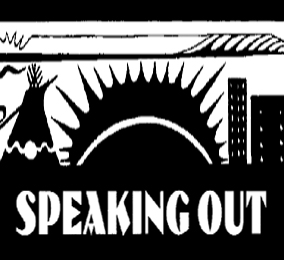by Don Jaque
(Northern Journal) – The hubbub has died down following the shocking ruling by the Human Rights Tribunal in late January that the Canadian government discriminates against First Nation children on reserves, failing to provide the same level of child welfare services that other kids in the country receive.
The injustice has been revealed, but what is the root cause and will anything meaningful be done?
Indeed, that revelation emphasizes a far deeper and more serious malaise within the federal government that must be recognized and dealt with. Entrenched discrimination against First Nation children on reserves is but one of many similar problems stemming from a combination of ineptitude and/or deep-seated colonialism within the department of Indigenous Affairs and Northern Development (DIAND).
Canadians assume DIAND “looks after” or “sees to the needs of” Canada’s indigenous citizens. That is obviously not the case.
There are more than 130 drinking-water advisories in 87 First Nation communities across the country, not including British Columbia or the three territories. That alone is a categorical denunciation of the department’s work. In some of those cases the local water has been unfit to drink for years, even decades. This reeks of incompetent administration.
Poverty and shameful housing conditions are all too common on reserves, a fact revealed repeatedly, year after year. It is only a matter of time before once again pictures of black mould on the walls of a hovel that is federal government reserve housing are splashed across media reports as some investigative reporter exposes yet another First Nation housing crisis. How can this be happening in Canada? How can it happen routinely for decades and never get fixed when so much money, people and resources are dedicated to it?
Drill down a little further and there are controversies over joblessness, poor graduation rates from high schools, the lack of adequate firefighting training and resources on reserves, and so on. The list seems never-ending.
Things like water treatment and enhancing local firefighting departments are basic issues that have ready solutions. Canadians go to countries around the world to foster services like those for other cultures. Why don’t we do so at home?
Some of the challenges, such as culturally relevant education, require more adaptive long-term solutions, which takes will and effort. There are other, deep-rooted issues like the tragedy of murdered and missing indigenous women, or health issues downstream of industry – ongoing in Fort McKay and Fort Chipewyan and common across the country. Those require complex systemic fixes.
The capability is there, but not the results. There are roughly 5,000 DIAND employees. They take home excellent wages, in almost every case much more than that earned by 90 per cent of the indigenous Canadians they purport to serve, yet they consistently fail. It is shameful.
The DIAND mandate is: “Working together to make Canada a better place for Aboriginal and northern people and communities.” Why is it not being carried out?
DIAND’s stated mission, on behalf of all indigenous Canadians, is to:
- Improve social well-being and economic prosperity;
- Develop healthier, more sustainable communities; and
- Participate more fully in Canada’s political, social and economic development.
Too often, in each of those three objectives, the opposite is true.
Carolyn Bennett, the new DIAND minister, a Toronto MP, served as minister of state for Public Health under former Liberal prime minister Paul Martin. She knows full well the troubling lot of indigenous Canadians, and must be aware how ineptly DIAND has dealt with that over time. She needs to make wholesale changes.
The Liberal election promise to invoke an inquiry into missing and murdered indigenous women is Bennett’s priority. She is engaging with family members of victims across the country, plus indigenous leaders at all levels, to seek their views on the scope and design of the inquiry. It is certain be a long, difficult, heart-wrenching process.
That terrible situation is only the tip of the iceberg. There are many more very serious issues facing indigenous Canadians Bennett must address. Her challenge is onerous. Unfortunately, DIAND is broken, and since it is essential in the execution of any solution, the Herculean requirement of reconstituting it must also be at the top of her list.
Her department is what she has to work with, and she needs to make it work.
The tack she must take is opposite to the caring, careful approach required in dealing with the tragedies of murdered and missing indigenous women. The entrenched culture must be eliminated and that will take drastic measures.
To fix her department, she must grab a broad axe and wade in swinging. The depth of failure at DIAND is so extensive that heads must roll and imperatives with deadlines must be issued. It is time her department became effective and did its job. It is time indigenous Canadians received the due diligence from “their” department that they deserve.
Don Jaque is the Managing Editor of Northern Journal. This article was originally published at Northern Journal.




Their are a lot of issues neglected not only poor housing and not enough along with enadquately water systems are only a few minor ignored items but also across the board with all other programs social education etc needs to be overhauled no more substandard treatment but rather dealt with.